Navigating the world of Applied Behavior Analysis (ABA) therapy can feel like a daunting journey for parents. It’s filled with challenges, but also incredible opportunities for growth! Understanding how to effectively support your child's therapy is crucial. After all, your active involvement can really enhance outcomes and foster lasting behavioral changes.
But what are the most effective strategies you can use to ensure your child's success in ABA therapy? 🤔 This article dives into ten essential approaches that empower you to make a meaningful impact on your child's development. Together, we can transform potential obstacles into stepping stones for success. Let’s explore this together!
At Rori Care, we understand that navigating ABA treatment can feel overwhelming for parents. That’s why our ABA Treatment takes a data-driven approach, ensuring that each young person’s treatment plan is tailored just for them. This personalized support is key to achieving successful outcomes, as it allows our clinicians to address the unique challenges each child faces.
We offer a variety of services, like:
These services are essential for unlocking the potential for success in behavior modification and skill development. And let’s not forget the importance of family involvement! Active participation from families is one of the effective strategies for parents to support ABA therapy success and reinforce the strategies learned during therapy.
Our dynamic approach means we regularly adjust plans based on the information gathered during sessions. This not only enhances skill development but also helps young individuals build independence, ultimately improving their quality of life. We also emphasize caregiver training as effective strategies for parents to support ABA therapy success, ensuring families receive the guidance and support they need to foster significant progress in their child’s development.
Let’s explore this together! We’re here to help you every step of the way!
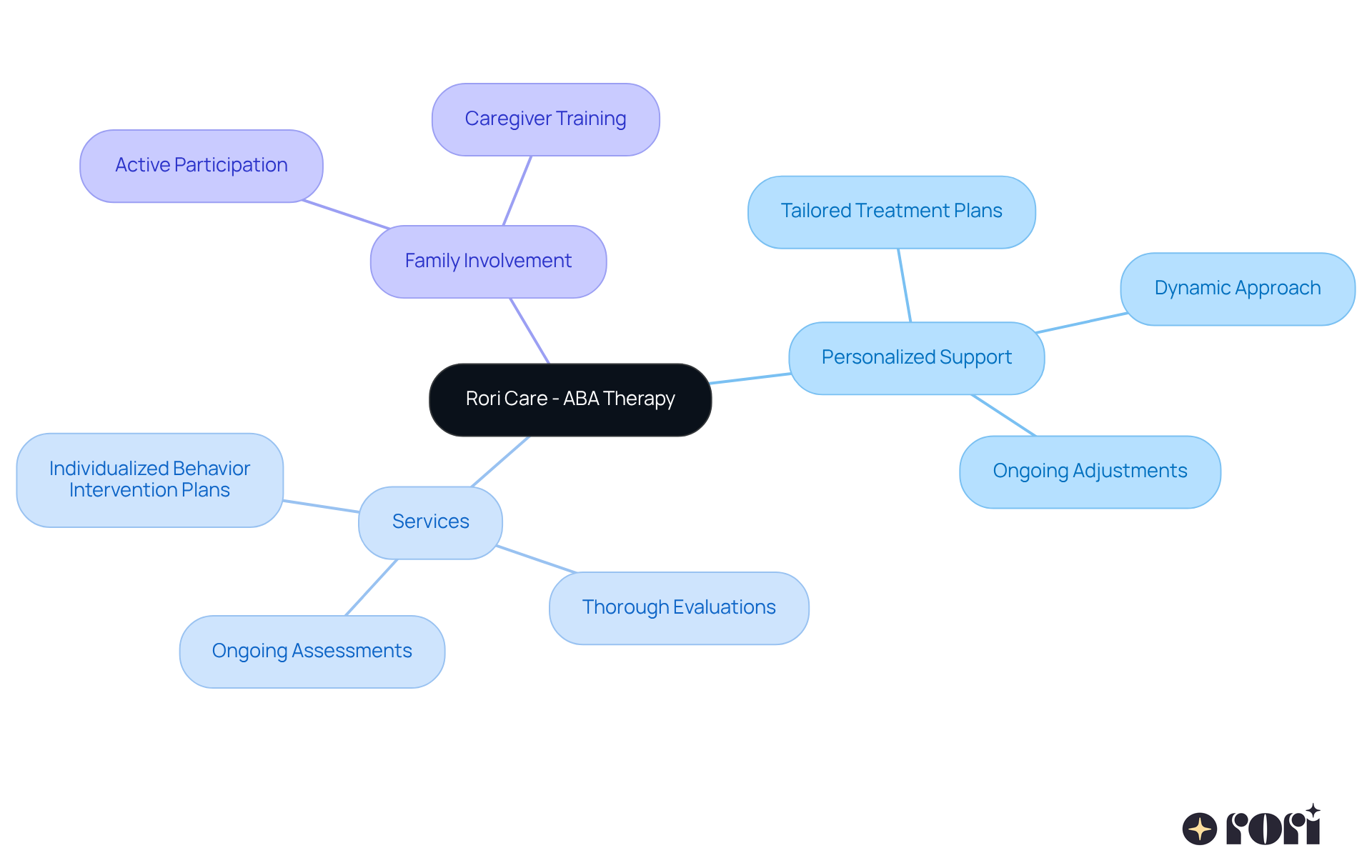
Active parental participation is one of the effective strategies for parents to support ABA therapy success, and it greatly impacts a young one's progress. Parents can boost their involvement by:
This teamwork not only reinforces the strategies shared during therapy but also ensures that kids get consistent support in different environments.
Therapists often highlight that family involvement is one of the effective strategies for parents to support ABA therapy success. When caregivers participate in real-time coaching during sessions, they can better understand and apply effective strategies for parents to support ABA therapy success at home. For example, using antecedent-behavior-consequence (ABC) charts can help caregivers spot triggers and patterns in their child's behavior, making it easier to implement targeted interventions.
Having strong support from caregivers is crucial because it facilitates effective strategies for parents to support ABA therapy success by ensuring a more consistent application across various settings. Successful family involvement can be seen in homes that utilize effective strategies for parents to support ABA therapy success by weaving structured play into daily routines, which can really unlock developmental potential and boost social skills. Plus, guardians who take part in treatment discussions often feel more confident in managing their child's behaviors, which are effective strategies for parents to support ABA therapy success and lead to better outcomes.
Research shows that effective strategies for parents to support ABA therapy success lead to improved communication skills, greater independence, and fewer challenging behaviors in kids. This dynamic not only strengthens the parent-child bond but also creates an environment where children can thrive, showcasing effective strategies for parents to support ABA therapy success and making the journey through intervention more fulfilling. To further support your child's development, why not set aside some time each week for organized play or practice of the skills they've learned? This reinforces the methods discussed in counseling and makes a real difference!
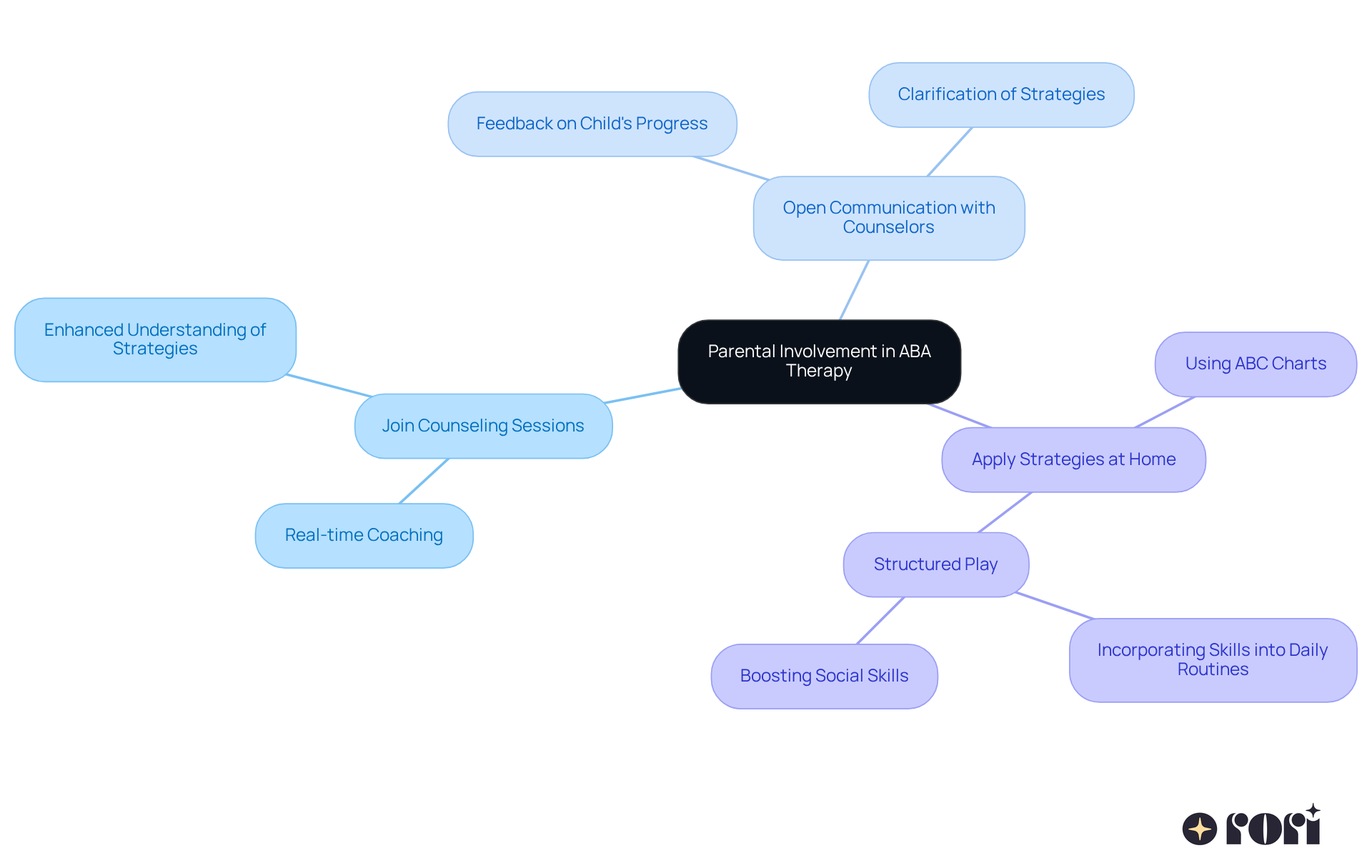
Positive reinforcement is such a powerful tool in ABA therapy! It encourages those desired behaviors by offering rewards or incentives that fit each child's unique needs. Parents can use effective strategies for parents to support ABA therapy success, like:
to motivate their kids effectively.
For instance, imagine your child finishes a task all on their own. A little encouragement or a fun activity can really strengthen that behavior, making it feel more significant and impactful. By setting measurable goals, you can keep track of your child's progress, allowing you to tweak your approach as needed.
Consistency is key here! When you regularly use effective strategies for parents to support ABA therapy success, it helps kids understand the connection between their actions and the positive outcomes that follow. This not only promotes a sense of empowerment but also fosters ownership in their behavioral growth.
Let’s explore this together! Remember, you’re not alone in this journey, and we’re here to help you every step of the way!
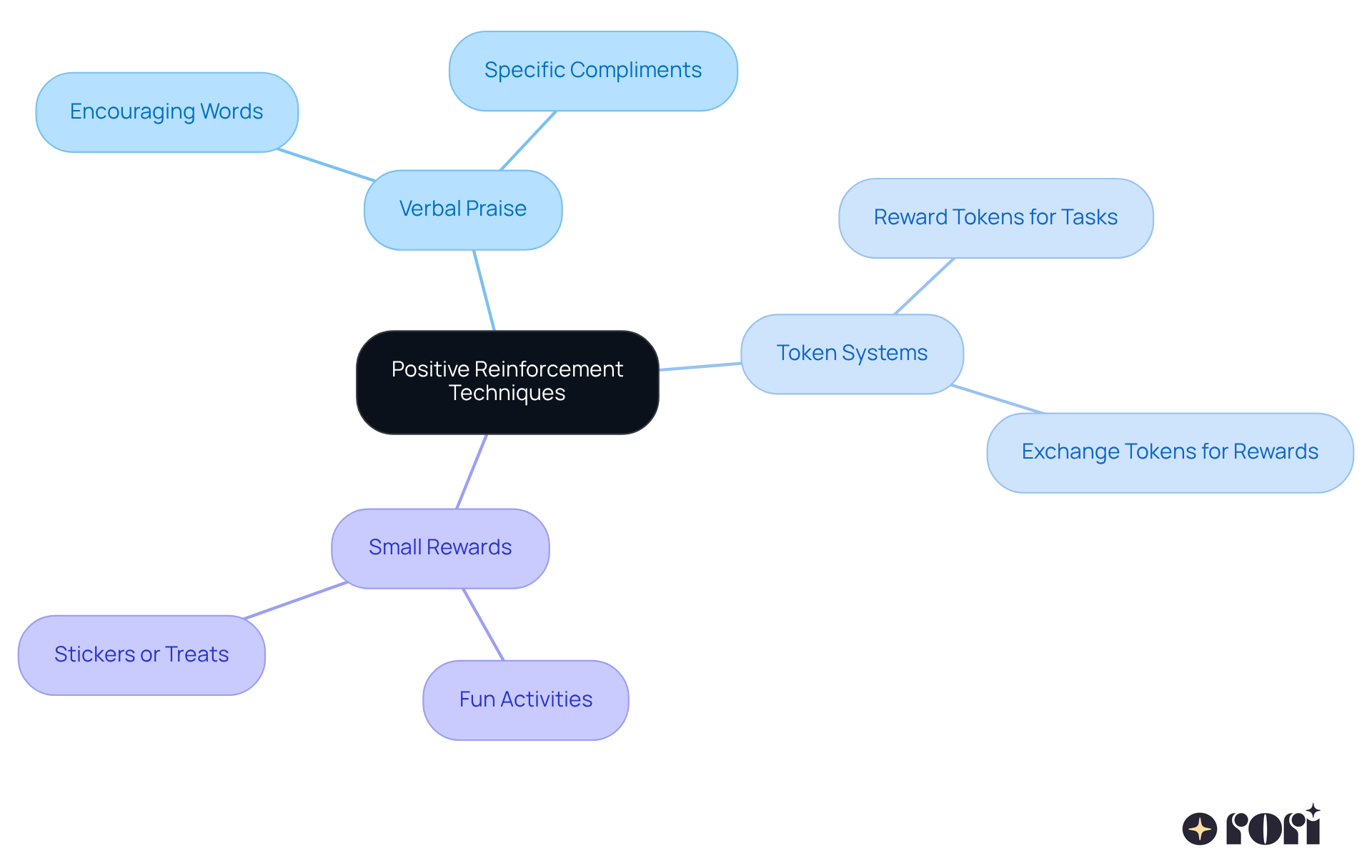
To enhance the effectiveness of ABA treatment, it’s important for guardians to use organized tracking techniques to observe their child’s progress. Keeping a behavior log is essential! It provides a detailed account of behaviors, helping parents and therapists spot patterns and areas that need attention. By using data collection tools like frequency and duration recording, you can measure behaviors precisely, which makes it easier to adjust treatment plans as needed.
Rori Care’s behavior care engine is a fantastic resource. It revises behavior intervention and skill acquisition plans after each session based on the progress made, ensuring that treatment stays adaptable to your child’s changing needs. And here’s something encouraging: research shows that when suggested hours are fully applied with active caregiver involvement, 90% of youngsters show significant progress!
Continuous observation can really boost treatment results. Kids often demonstrate notable advancements when their progress is evaluated regularly. Clinicians stress that effective monitoring methods, like anecdotal data documentation and ABC data collection, are crucial for understanding the context of behaviors and tailoring interventions accordingly. By actively participating in your child’s growth, you can utilize effective strategies for parents to support ABA therapy success, making the treatment both effective and empowering.
To support this journey, consider scheduling regular check-ins with your therapists as effective strategies for parents to support ABA therapy success. It’s a great way to discuss progress and adjust strategies as needed. Let’s explore this together! We’re here to help you every step of the way!
![]()
Creating an organized home setting is crucial for parents to implement effective strategies for parents to support ABA therapy success, helping kids thrive with the skills they learn through ABA intervention. Consider this: when parents implement daily routines that encompass consistent times for meals, play, and therapy sessions, they are utilizing effective strategies for parents to support ABA therapy success! Studies show that having organized routines can boost emotional control and reduce anxiety, allowing kids to focus better on picking up new skills.
Visual schedules can be a game-changer, too! They provide clear expectations and help little ones manage transitions throughout the day. When kids know what to expect, they feel more secure and confident, which is key to learning and applying new skills effectively. As experts say, "Daily routines form the backbone of a successful day for any individual, and for those with autism spectrum disorder (ASD), implementing effective strategies for parents to support ABA therapy success through structured routines is not just beneficial - it’s transformative."
This predictability helps kids mentally prepare for transitions and activities, which can really cut down on the overwhelm that sometimes leads to meltdowns or behavioral challenges. So, let’s explore this together! By creating a structured environment, you’re not just helping your child; you’re also fostering a sense of community and support for your family.
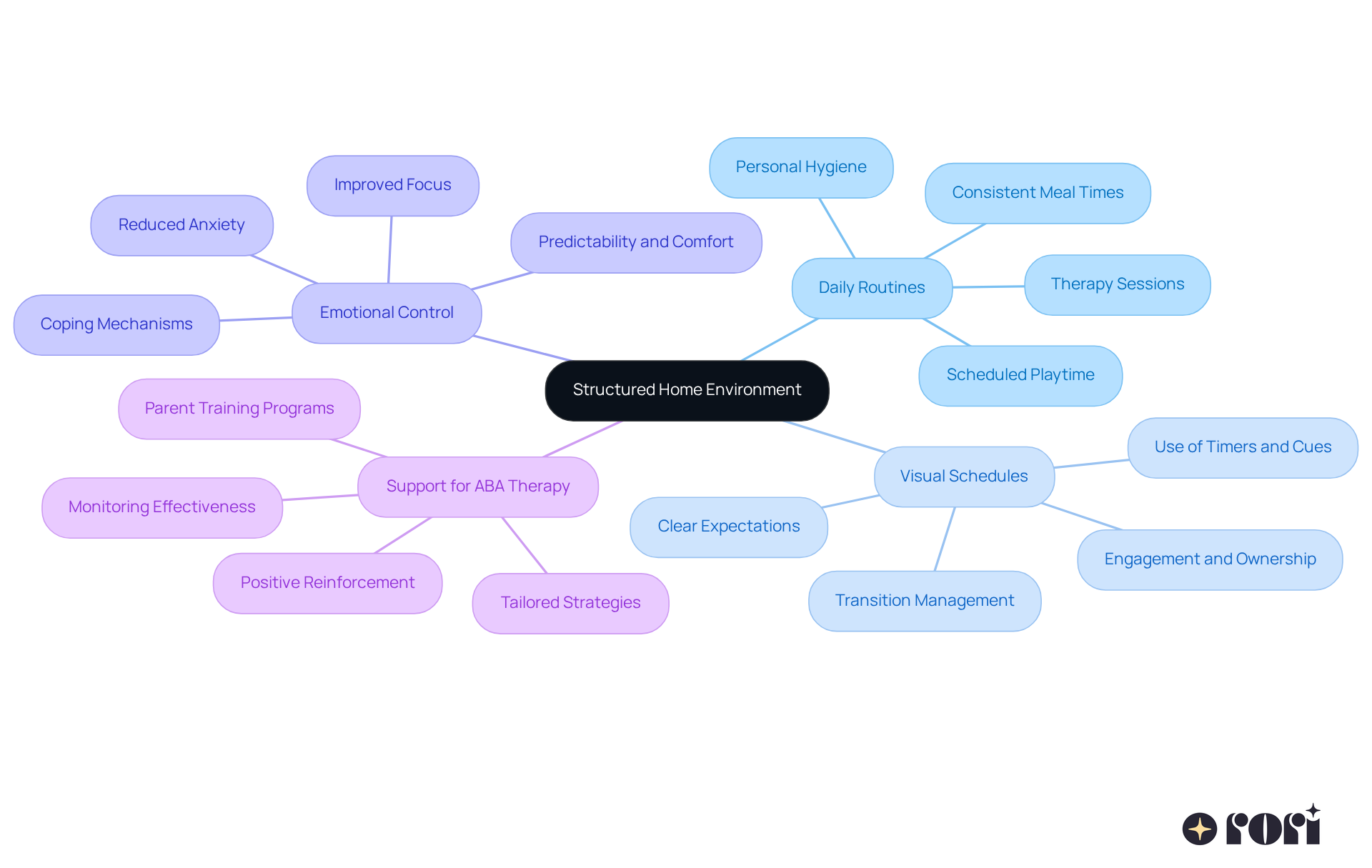
Building a strong partnership with therapists is among the effective strategies for parents to support ABA therapy success! Parents, it’s essential to keep those lines of communication open with your child’s BCBA and therapists to establish effective strategies for parents to support ABA therapy success. Share your concerns, observations, and work together on setting goals. Regular check-ins and updates can really help everyone stay on the same page about your child’s progress and treatment strategies.
Research shows that when parents and therapists communicate effectively and share responsibility in goal-setting, it leads to effective strategies for parents to support ABA therapy success. Caregivers often feel more competent and involved in the process, which is a win-win! This collaborative approach not only boosts the effectiveness of treatment but also offers effective strategies for parents to support ABA therapy success while playing an active role in their child’s development. Moreover, it can help reduce stress and improve family dynamics, serving as effective strategies for parents to support ABA therapy success.
Key Benefits of Caregiver Education:
BCBAs emphasize that strengthening collaborations with parents leads to better alignment of treatment goals. This ultimately creates a more supportive environment for individuals with autism. Effective teamwork has been shown to enhance social skills and emotional regulation, underscoring effective strategies for parents to support ABA therapy success.
Let’s explore this together! We’re here to help you every step of the way!

Parents often find themselves facing some tough challenges when it comes to applying ABA methods. You might notice your child resisting, not being involved consistently, or struggling to generalize the skills they learn during sessions. It’s not uncommon! Studies show that many kids can be reluctant to jump into therapy activities, which can be frustrating. But don’t worry - there are several strategies you can try to make things easier:
Break Tasks into Smaller Steps: Think of it like climbing a staircase. When you break tasks down, they feel less overwhelming for your child. This way, they can gradually master each skill, and you’ll see them feeling more successful with every little step they take.
Utilizing visual supports is one of the effective strategies for parents to support ABA therapy success! They help kids understand and remember better, making it easier for them to follow directions and stay engaged.
Maintaining a positive attitude is one of the effective strategies for parents to support ABA therapy success, as it helps create a supportive and encouraging environment that can boost their child’s motivation. When they feel less anxious, they’re more open to learning.
Don’t hesitate to reach out to therapists for effective strategies for parents to support ABA therapy success that fit your child’s unique needs. As Ralph Moller wisely points out, 'Family participation in treatment is also crucial for effective outcomes.'
Connecting with other caregivers is one of the effective strategies for parents to support ABA therapy success. Sharing experiences and strategies can provide you with the support and practical advice you need to navigate the complexities of ABA therapy.
Additionally, educating yourself about effective strategies for parents to support ABA therapy success can significantly improve your ability to help your child achieve their behavioral goals. The more you understand, the better choices you can make that positively impact your child’s progress. Did you know that only 15% of insured minors referred for ABA-based behavioral health treatment received 80% or more of the recommended treatment hours? This highlights how common resistance can be and underscores the importance of these strategies.
By embracing these methods and expanding your understanding, you can discover effective strategies for parents to support ABA therapy success and boost your child’s involvement. This can lead to improved outcomes in communication, social skills, and overall behavior. Let’s explore this together! We’re here to help you every step of the way!
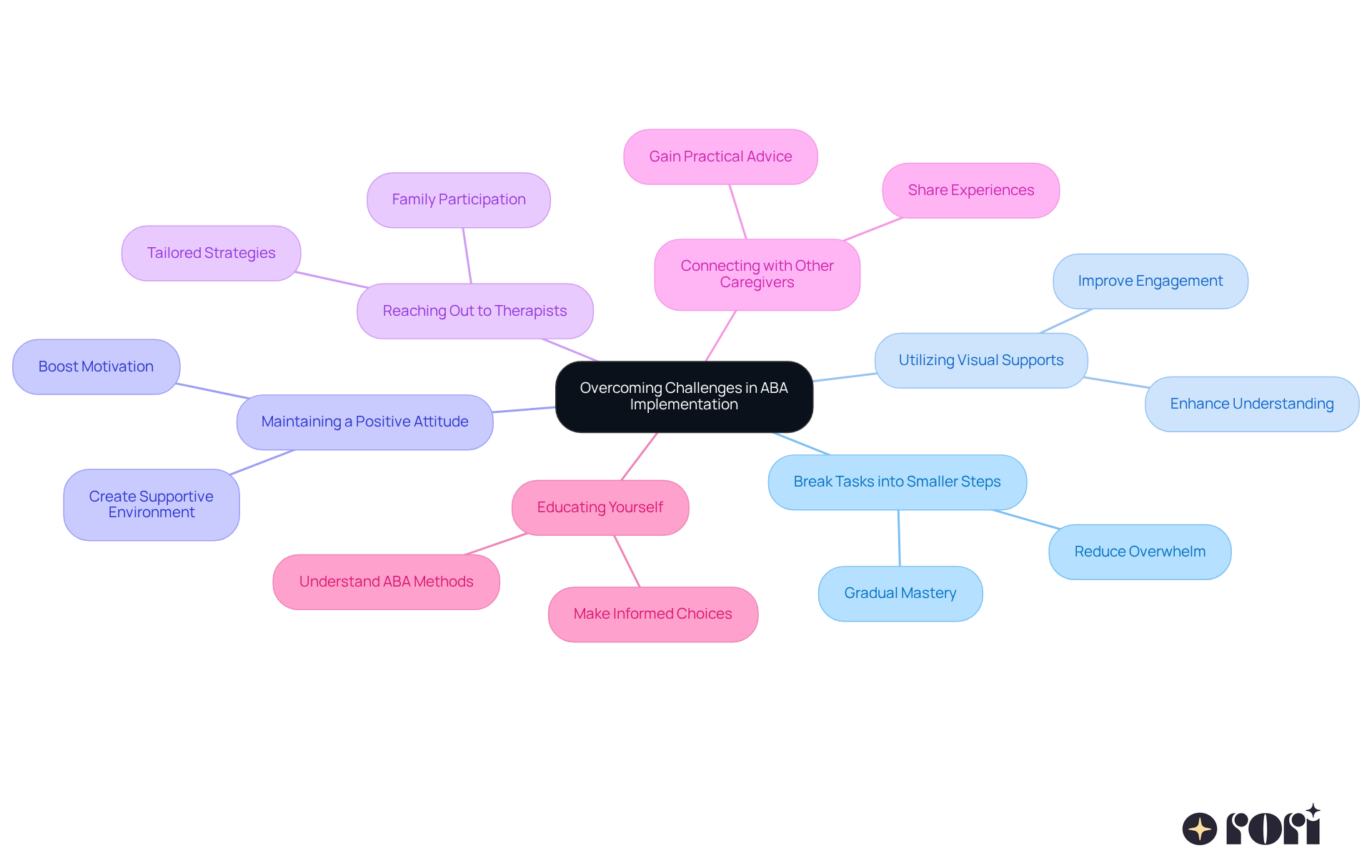
Incorporating technology into ABA treatment can really boost engagement and make data collection a breeze! Parents can tap into specialized apps that help track progress, featuring visual schedules and interactive learning tools to reinforce skills. For instance, a visual timer can be a game-changer for young learners, helping them grasp time management during tasks and enhancing their focus and task completion.
Plus, telehealth options offer flexibility for accessing counseling sessions, ensuring that young individuals can receive consistent support no matter where they are. Did you know that a whopping 50% of ABA intervention time goes into writing reports? This is where technology steps in, simplifying the intervention process and offering effective strategies for parents to support ABA therapy success while allowing families to actively participate in their child’s development. It creates a collaborative environment that boosts overall treatment effectiveness.
To get started with technology in a meaningful way, parents can explore various apps designed for tracking their child’s progress. Engaging in regular communication with therapists is also key to employing effective strategies for parents to support ABA therapy success and ensuring a united approach to their development. Let’s explore this together! We’re here to help you every step of the way!
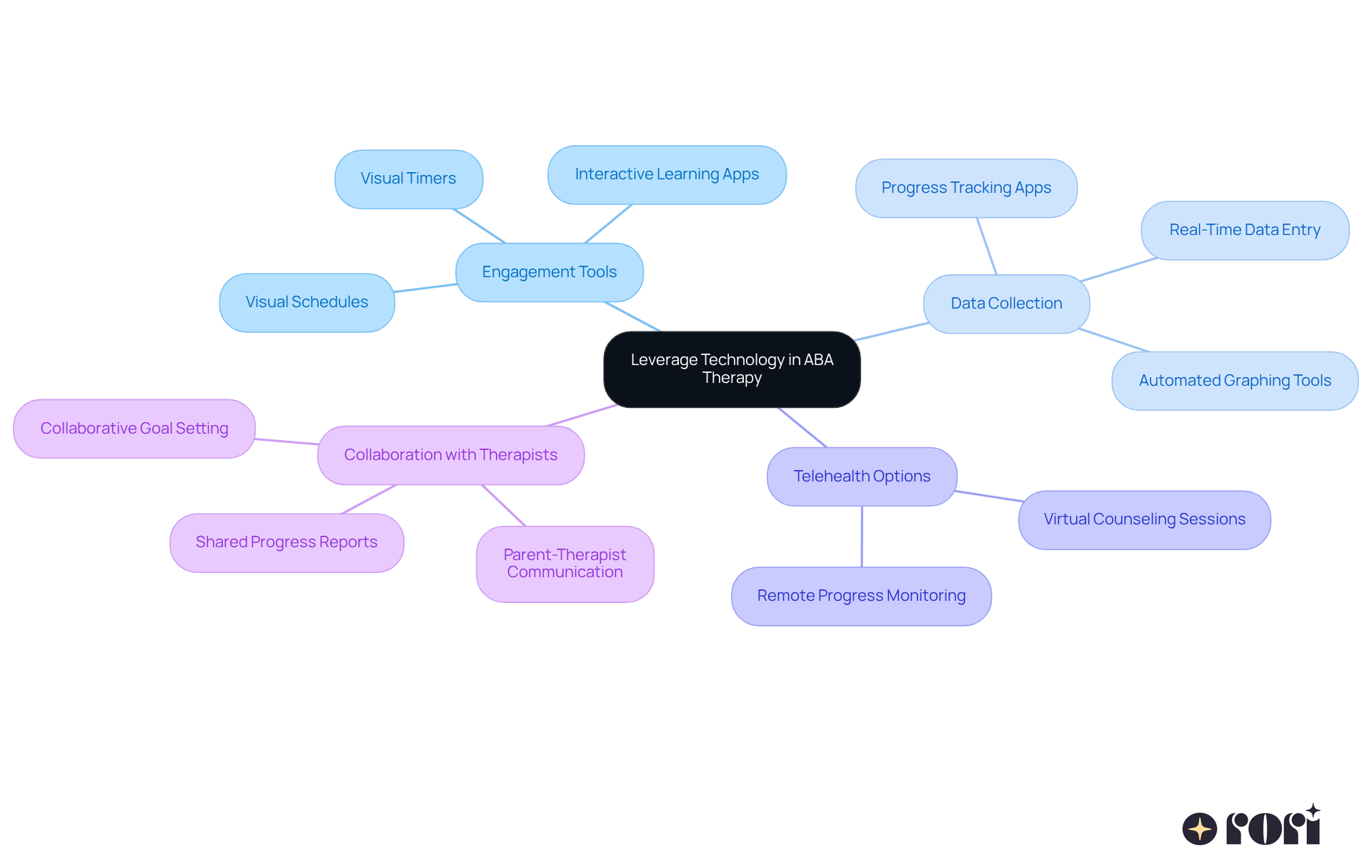
For parents who want to help their kids grow and thrive, understanding the basics of Applied Behavior Analysis (ABA) treatment is essential as it involves effective strategies for parents to support ABA therapy success. By diving into workshops, online resources, and books about ABA techniques, you can learn about key concepts like reinforcement, prompting, and behavior modification. This knowledge not only boosts your ability to support your child's needs but also helps build a strong partnership with therapists, making the whole experience even better.
Research shows that when parents use effective strategies for parents to support ABA therapy success, it leads to better skill reinforcement and improved treatment outcomes. Plus, educators point out that when you grasp ABA principles, you can develop effective strategies for parents to support ABA therapy success by creating a more supportive home environment that reinforces what your child learns, ensuring that progress continues even outside of therapy sessions.
By getting familiar with ABA techniques, you can make a significant impact on your child's development and effectively advocate for any necessary changes in their treatment. So, let’s explore this together! We’re here to help you every step of the way!
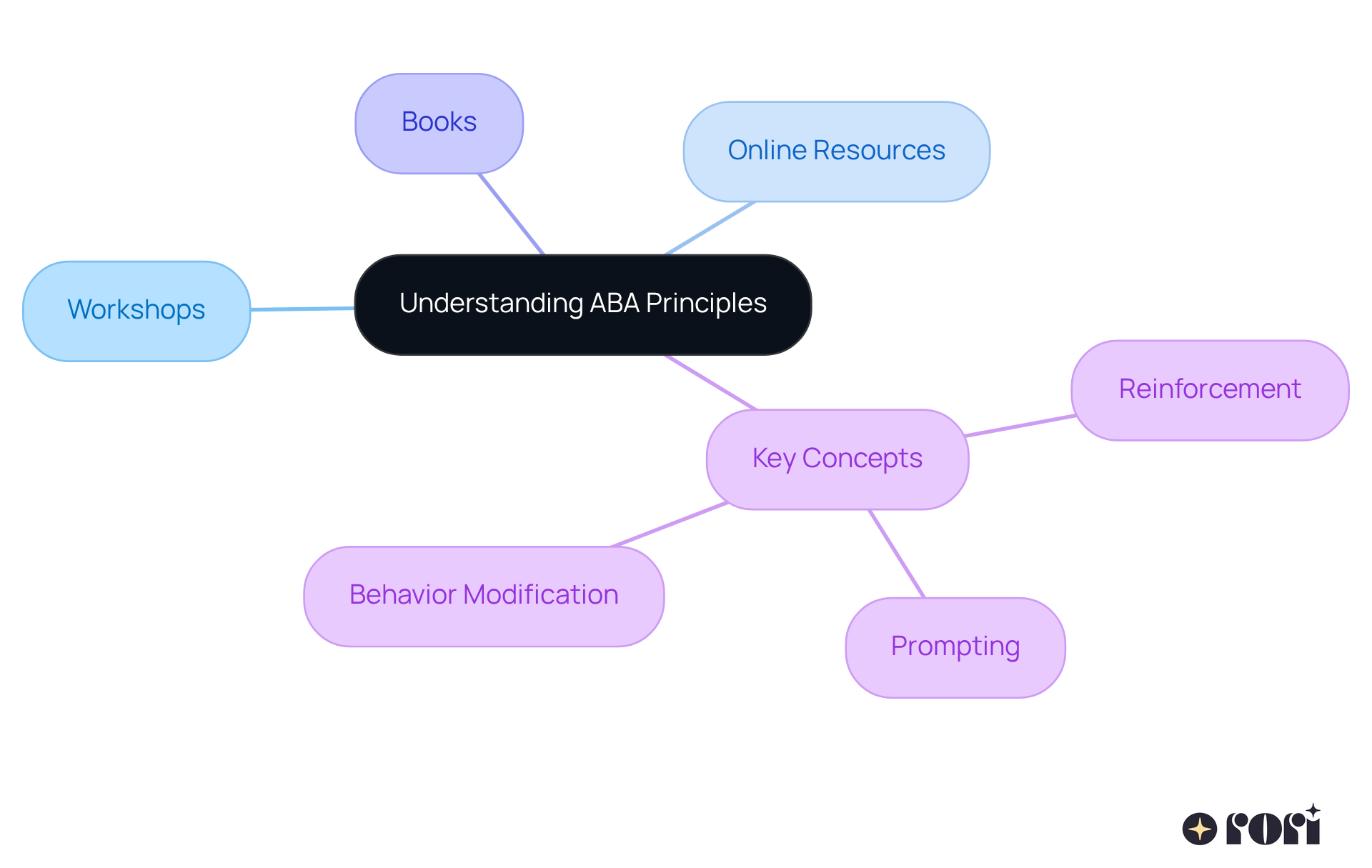
Encouraging self-advocacy in individuals with autism is such an important part of their growth! Parents can really motivate their kids to express their needs, preferences, and feelings, not just during counseling sessions but in everyday life too. Think about using:
By promoting self-advocacy, you’re helping your child take an active role in their therapy, which can really boost their confidence and independence.
Plus, when parents learn more about effective strategies for parents to support ABA therapy success, they gain a deeper understanding of how to effectively support their child. This knowledge empowers you to make informed choices that can positively impact your child’s progress. It’s all about creating consistency in therapeutic approaches, which leads to better behavioral outcomes and a happier family dynamic.
Let’s explore this together! Your journey in supporting your child is unique, and every step counts!
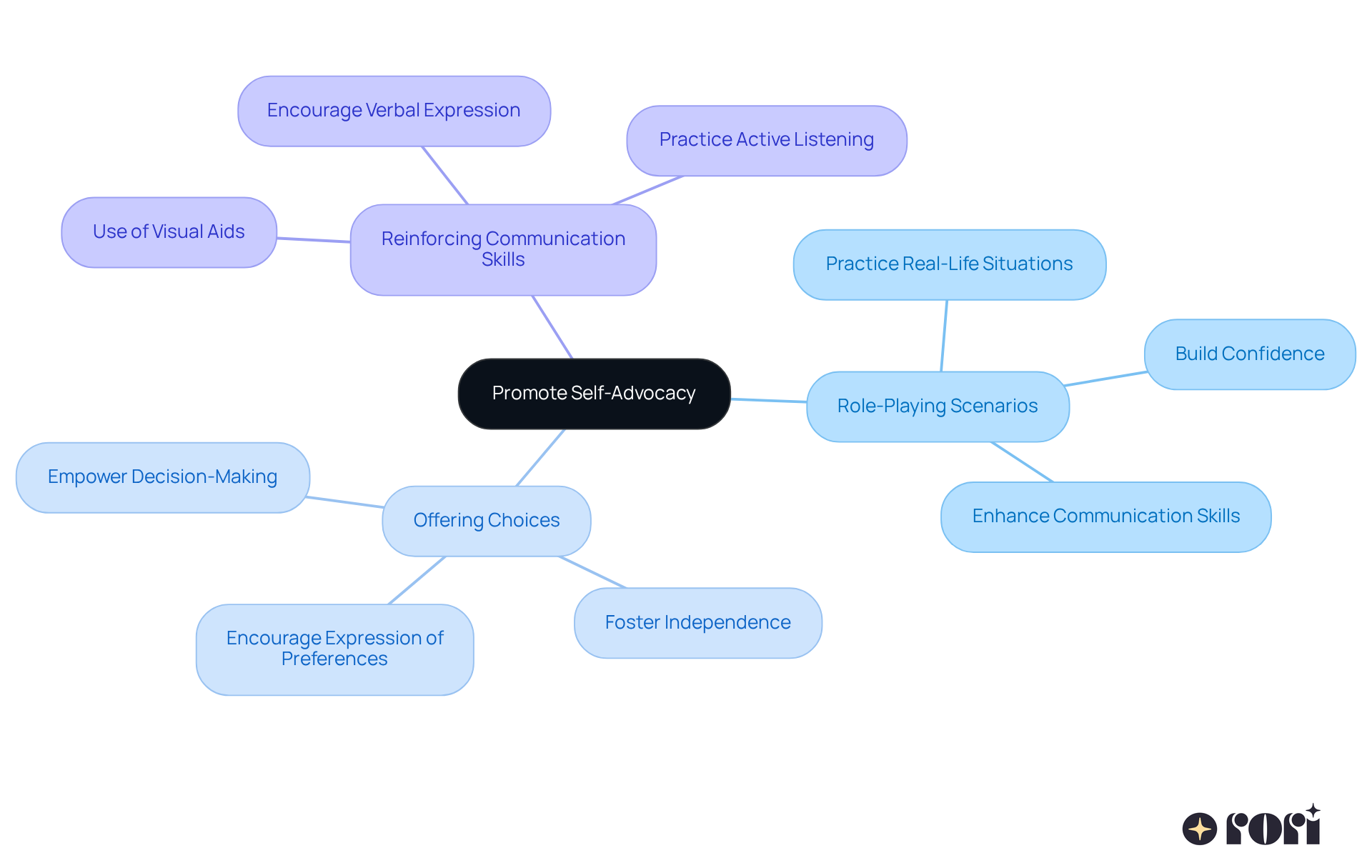
Supporting a child through ABA therapy is quite the journey! It takes dedication, understanding, and a hands-on approach from parents. Remember, you play a crucial role in your child's success by working closely with therapists, setting up structured routines, and using strategies that fit your child's unique needs.
Throughout this article, we've shared some effective strategies to help you support your child's ABA therapy journey. Think about:
Collaborating with professionals and using technology can really boost treatment outcomes, too! Plus, taking the time to learn about ABA principles and encouraging self-advocacy in your child are empowering steps for both of you.
In closing, remember that this journey isn’t just about your child; it’s a partnership involving you, therapists, and the community. By embracing these strategies and staying committed to your child's progress, you can make a significant impact on their development and overall well-being. As you navigate this path, the insights and tools shared here can help create a supportive environment where your child can thrive and reach their full potential. Let’s explore this together!
What is Rori Care's approach to ABA therapy?
Rori Care uses a data-driven approach to ABA therapy, creating personalized treatment plans tailored to each child's unique challenges to achieve successful outcomes.
What services does Rori Care offer in ABA therapy?
Rori Care offers individualized behavior intervention plans, thorough evaluations, and ongoing assessments to support behavior modification and skill development.
How important is family involvement in ABA therapy?
Family involvement is crucial as it reinforces strategies learned during therapy and provides consistent support across different environments, enhancing the child's progress.
What are some ways parents can engage actively in their child's ABA therapy?
Parents can engage by joining counseling sessions, maintaining open communication with counselors, and applying effective strategies at home to support therapy success.
What role does caregiver training play in ABA therapy?
Caregiver training is essential as it equips families with effective strategies to support their child's development, ensuring they can foster significant progress in therapy.
How does positive reinforcement work in ABA therapy?
Positive reinforcement encourages desired behaviors by providing rewards or incentives, such as verbal praise or small rewards, tailored to each child's needs.
Why is consistency important in using strategies for ABA therapy success?
Consistency helps children understand the connection between their actions and positive outcomes, promoting empowerment and ownership over their behavioral growth.
What are some effective strategies parents can use to support ABA therapy at home?
Parents can use verbal praise, token systems, and small rewards to motivate their children and reinforce the skills learned during therapy sessions.